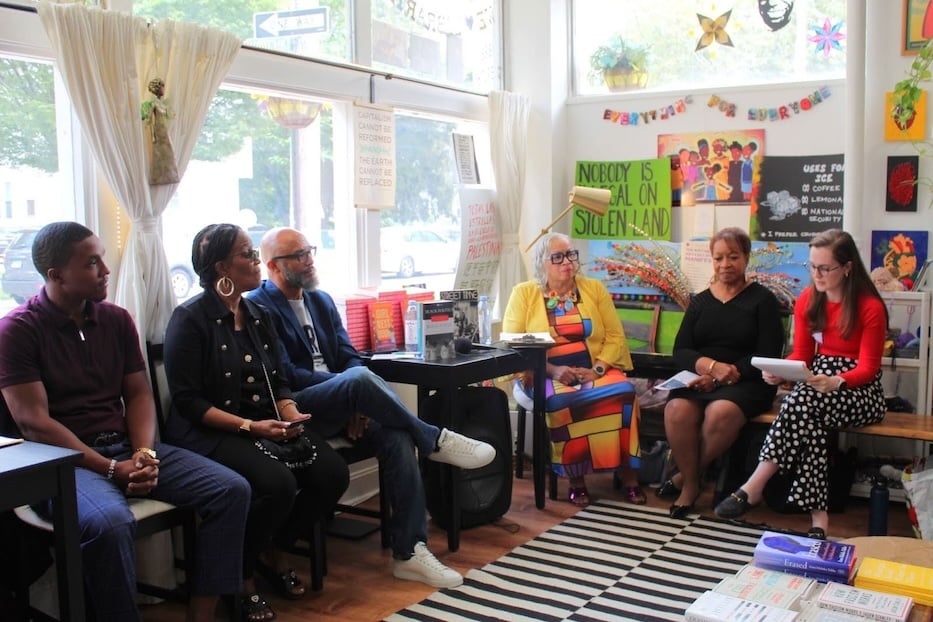
Abiba Biao Photos.
Marcella Monk Flake vividly remembers being 10 years old, and playing a spirited game of catch in front of her home on Cedar Street. Despite her father's multiple warnings, Monk Flake and her sister Pamela tossed the ball back and forth, glad to be outside. Then Pamela—she is now Dr. Pamela Monk Kelley—threw the winning pitch, and broke their window.
Later that day, the U.S. National Guard descended on New Haven, erecting floodlights in the streets. Tear gas flooded the Monk household and Monk Flake and the rest of her siblings rushed to flush out their eyes, trying to relieve themselves of the burning sensation.
Last Saturday, Monk Flake brought that memory to Possible Futures at 318 Edgewood Ave., for the launch and celebration of a new Communities Histories Lab at the Yale School of Medicine. A project that blends first-person narratives, public health, and documentary research, the lab seeks to “make local histories accessible outside the walls of the academy,” according to its mission statement. Roughly 75 people attended.
“Instead of academic researchers, we're interested in lifting up the stories, perspectives, and values of actual New Haven residents,” said Marco Ramos, assistant professor in the History of Medicine and Department of Psychiatry at Yale University. “And we're particularly interested in unearthing histories of community justice work.”
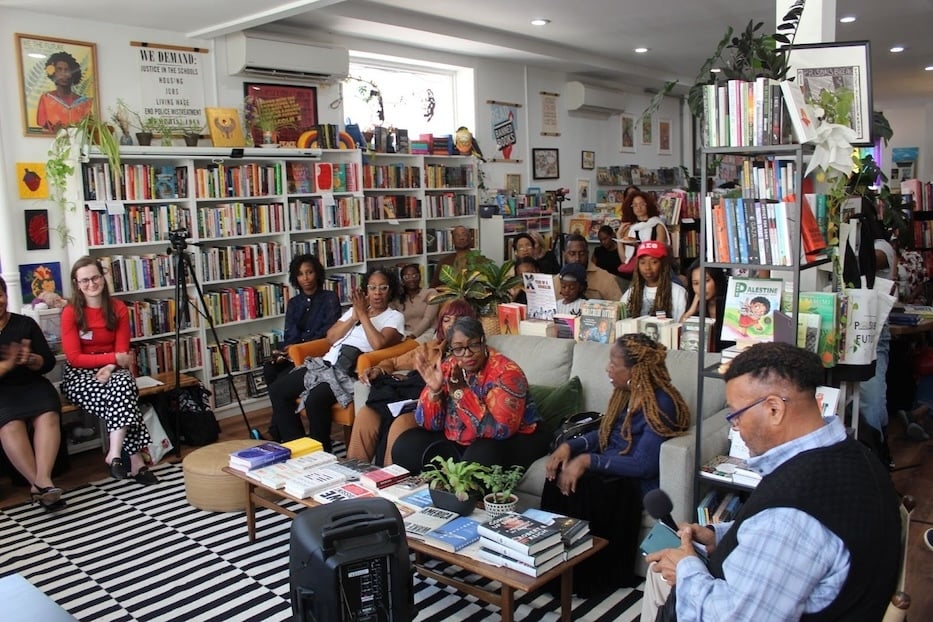
The lab is currently conducting six research projects, which include the Anti-Eugenics Collective at Yale, the Community Health History as Harm Reduction initiative, the Cushing Patient Archives Project, the Mistrusting Yale Project, and the Reproductive Health Histories New Haven.
Saturday, the launch lived that mission through a panel on the history and legacy of Hill activist Fred Harris, and the way social justice activism lives on and shows up in New Haven today. In addition to Harris’ children, Vanessa Harris and Fred Harris III, it featured sisters Marcella Monk Flake and Pamela Monk Kelley, who grew up in the Hill during the 1960s, and Harris’ grandson, Day'Shawn Lyons.
As Ramos and colleague Ayah Nuriddin kicked off the discussion, Monk Flake set the tone, describing Harris as a “rockstar,” for his “courage and the determination to forge change.”
“Fred Harris was an icon in the Hill neighborhood. He was a man of short stature physically, but his work was big,” Monk Flake said. “He just had an aura about him.”
As she and Monk Kelley shared memories from their childhood, both also spoke about how New Haven history, and the deep and sometimes difficult lessons of the past, can inform an increasingly frightening present. In 1967, New Haven was one of many cities to experience what is now widely known as the long, hot riots. In New Haven, the Hill became the epicenter of that action when a white business owner shot a Puerto Rican city resident.
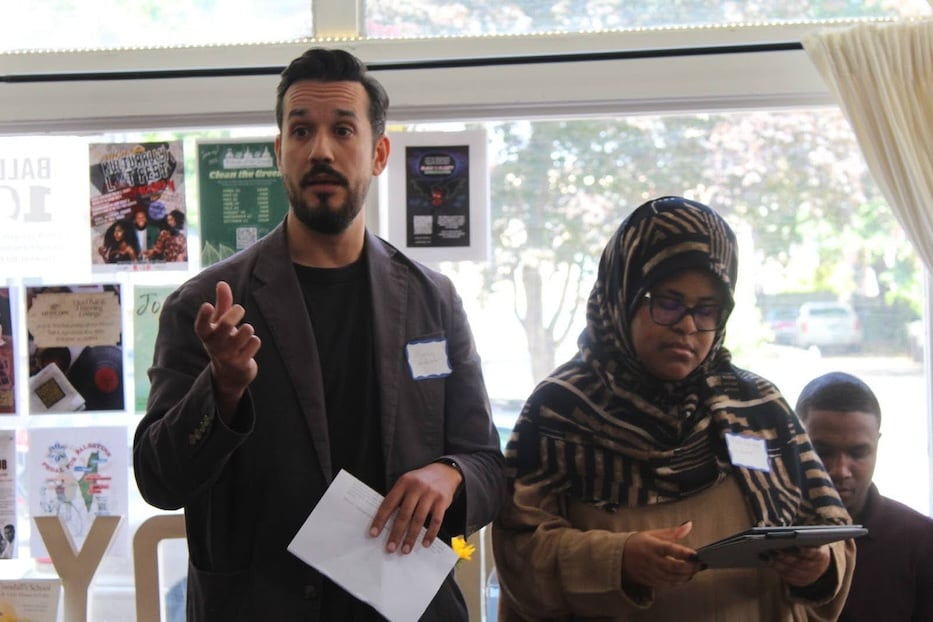
Almost six decades later, Monk Flake thought instantly of that history when she saw that President Donald Trump had deployed the National Guard in Washington D.C., in what many people (including historians, politicians, and activists) see as a test for other cities that have large Black and immigrant populations (Memphis, Tenn. became the second such city this week, after Los Angeles much earlier this year).
“It was frightening to see these men with long guns, waving guns like ‘Get out of the window. Get in your houses,’” she recalled. “It was horrifying and to know that other children have to experience that — not just children but adults — it’s been so triggering for me.”
In the audience, Lamley Lawson shot up her hand to grab the mic. She pointed to the rise of social media and the increasing presence of a surveillance state, asking what role technology might play as the practices of and around social justice change with the times.
“What are your thoughts sort of digging deeper about that lack of space, or maybe grace, for leaders and emerging leaders and how can we move past that in this time that calls for critical movement?” she asked.
Lyons argued that social media is a nuanced tool. While he doesn’t believe that social media dampens the emergence of grassroots leaders like his grandfather, he thinks social media can foster complacency and performative activism.
“There has always been information campaigns to discredit powerful leaders,” he said. “Has the method and way it happens today changed? Yes, but I feel like there is a bigger issue at hand… social media has made a lot of people think that posting is activism.”
Vanessa Harris offered a rebuttal to his argument, highlighting the power social media has to mobilize people and improve the circulation and accessibility of information. She noted the recent Target boycotts earlier this year after the company repealed its diversity, equity, and inclusion (DEI) initiatives.
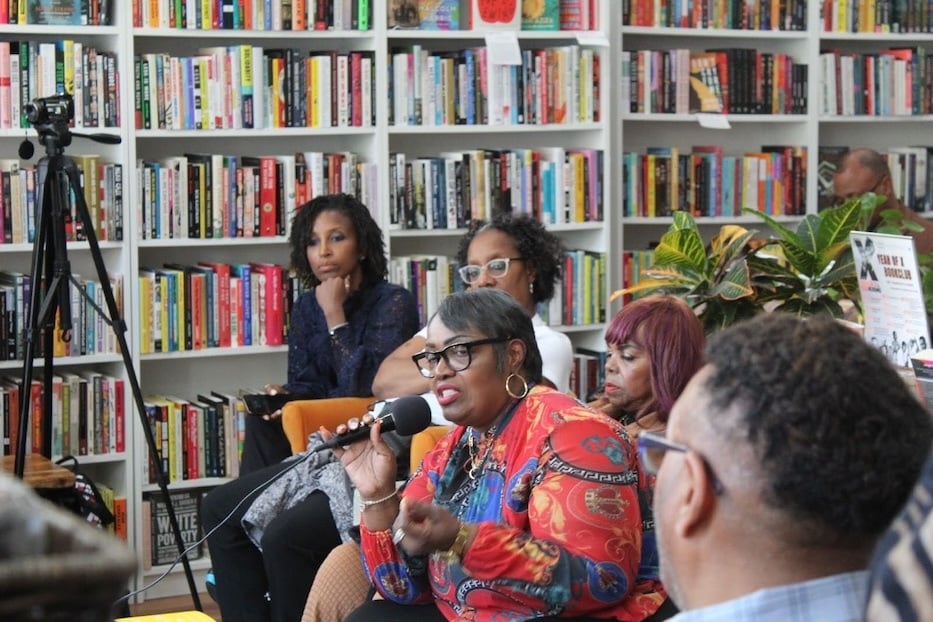
In the discussion that followed, attendee LeChristien Box was eager to share her own thoughts on the matter. Like Lyons, Box believes that social media can provide a false sense of social change.
“One of the things that I see with people today with social media [is that] it’s an easy place to hide behind,” she said. “They can say, ‘Well, I can engage,’ but really not be involved.”
She also pushed back against Lawson’s suggestion that there aren’t as many clear and decisive leaders as there were in the last century. She remains optimistic and leans towards the side of hope.
“I don’t believe our forefathers would have wanted us to go back,” she said. “ I don’t believe Apostle Fred Harris would want us to go back. He would say ‘Do more than what I’ve done. Go farther than where I’ve been.’”
In an interview after the panel, Box also added that she herself was also learning something new about history. Despite being a 60s baby herself and close to age to the elders on the panel, she said that it was her first time encountering many of the historical moments that the panelists alluded to.
Box, who came from Gary, Indiana for the panel, said she sees the similarities between many of the anecdotes panelists shared and issues in her own community. Box has been a pastor for 17 years and currently works at the Greater Life Chapel Outreach Ministries. She said that the lecture invigorated her spirit for organizing and community service, saying that older people have a place in activism.
“If we help people based on who we know then we have a problem," she said. “So it’s about who we don’t know [for] who we want to help… this just encouraged me to even, in spite of the health that I don’t have, to continue fighting and going even farther, to continue going off, because it’s for a reason and it’s for a purpose.”
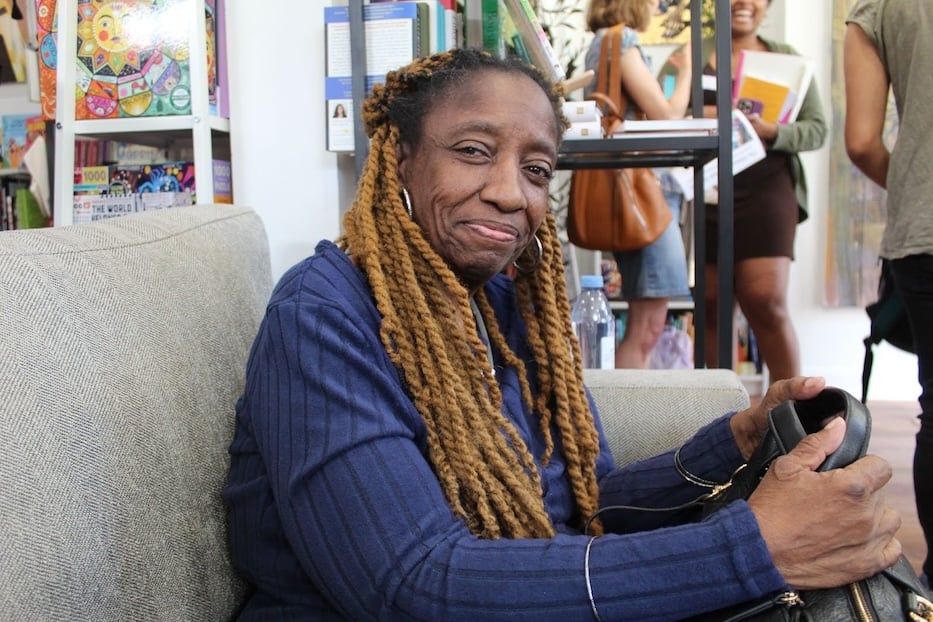
Tifanie Brooks was left with the honor of leaving the panelists one last thought-provoking query: “Are we still our brother’s keepers?”
Brooks has been a member of Harris’ church, New Risen Christ Ministries International, for 28 years and came to New Haven from Detroit to witness the launch of the Community Histories Lab. She remarked on the younger generation's adoption of individualism and lack of care among people.
“I feel that we don't take responsibility any more for others,” she said after the panel, explaining the inspiration behind her question. “It's just about me, me, me, me, me. We have to go off to come together as a people and as a country.”